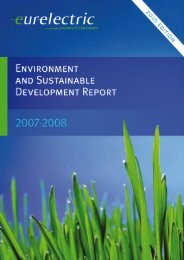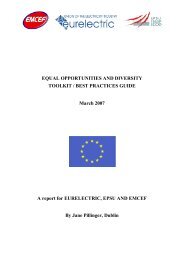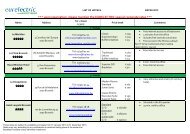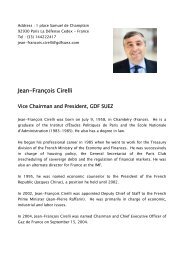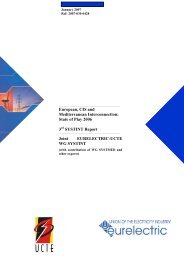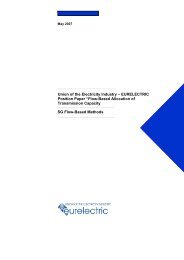Activity Report 2012 - Eurelectric
Activity Report 2012 - Eurelectric
Activity Report 2012 - Eurelectric
Create successful ePaper yourself
Turn your PDF publications into a flip-book with our unique Google optimized e-Paper software.
Wholesale markets: Getting the market design right<br />
The wholesale market agenda in <strong>2012</strong> was strongly shaped<br />
by the development of key network codes for electricity and<br />
gas, slow progress in the emergence of a core integrated<br />
region in north Western Europe (nWE), as well as essential<br />
market design issues such as increasingly negative<br />
operating margins in flexible back-up plants and the steps<br />
needed to bring RES technologies in line with market rules.<br />
Close liaison with market stakeholders throughout the year<br />
resulted in a good degree of consensus on the development<br />
of the network code on capacity allocation and congestion<br />
management. EURELECTRIC nevertheless feels that TSOs<br />
could be more transparent on issues of vital importance<br />
for the market (e.g. bidding zone configuration, capacity<br />
calculation, cross-border redispatch). They should also<br />
establish clear liability rules and fall-back mechanisms in<br />
case of operational deficiencies in the price-coupled spot<br />
markets and the cross-border intra-day platform – both of<br />
which are essential to establish the integrated pilot region<br />
in north Western Europe.<br />
Despite intense activities between the TSOs and power<br />
exchanges involved in the nWE project, progress has been<br />
limited in the region in <strong>2012</strong>. The price coupling of spot<br />
markets is expected to go live in the second quarter of<br />
2013 while the establishment of an intra-day platform has<br />
been further delayed, with great uncertainty as to when the<br />
platform will be up and running. This delay, together with<br />
the lack of willingness to ‘market-proof’ these integration<br />
projects by sharing information and allowing feedback,<br />
has negatively affected market confidence and trust in<br />
project leaders to deliver a suitable mechanism.<br />
Greater focus was placed this year on market design<br />
aspects linked to the growth of renewables. The possible<br />
introduction of capacity remuneration mechanisms across<br />
some member states raised new issues regarding a<br />
possible evolution of the electricity market design and<br />
the achievement of an internal electricity market.<br />
As a firm supporter of liberalised and integrated energy<br />
markets, EURELECTRIC holds that integrated electricity<br />
markets are the best way to achieve a smooth transition<br />
towards a decarbonised economy. In order to deliver<br />
generation adequacy, energy markets should be allowed<br />
to function properly, eliminating distortions such as<br />
regulated end-user prices, restrictions on plant operations,<br />
and price caps. Enabling demand to participate in<br />
wholesale market spot price formation is also fundamental.<br />
When generation adequacy is nevertheless endangered<br />
capacity remuneration mechanisms should be considered,<br />
ideally at a regional level or at least in coordination with<br />
neighbouring markets and, in any case, consistent with<br />
the process of EU market integration.<br />
Given the far-reaching effects of intermittent generation<br />
on electricity markets, EURELECTRIC also recalled the<br />
importance of bringing renewables into electricity markets,<br />
thereby ensuring a level playing field among all generating<br />
technologies with respect to connection, scheduling, and<br />
balancing requirements.<br />
23



